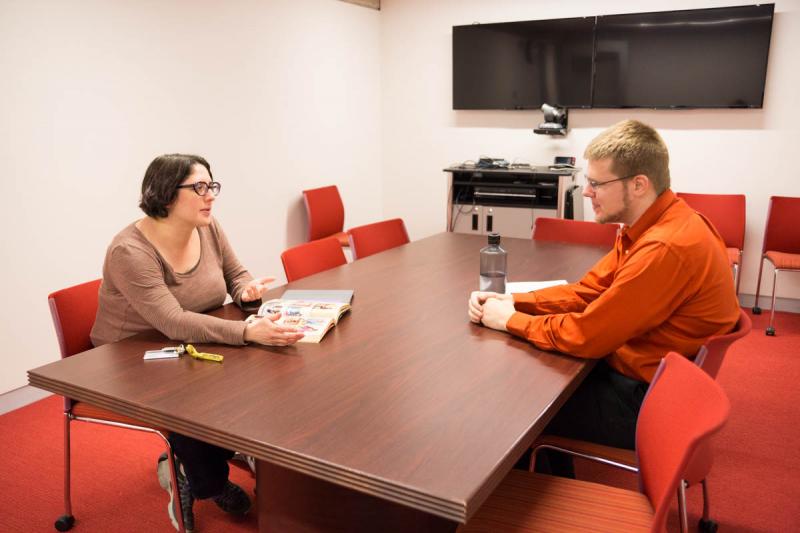UMass gets heavy with Dystopia Fiction Book Club
What do the dystopian societies, bleak settings and tortured characters of “The Hunger Games,” “1984” and “Watchmen” share in common? They’re all topics of discussion at UMass Dartmouth’s Dystopian Fiction Book Club.
UMass librarians Hilary Kraus and Zack Painter are just two members of the dystopian fiction club who met up on Friday, Feb. 26 to discuss their latest read.
“It's something really popular, something that people really enjoy reading,” said Kraus.
“Plus, this campus was founded on a utopian ideal,” Painter said, referring to UMass architect Paul Rudolph’s vision for the school as an academic utopia.
The club was founded by Kraus and Kari Mofford, the Undergraduate and User Services Librarian and English professor Alexis Teagarden. Though it was created by staff and faculty, they got some student involvement as well.
Themes and character relationships are the central topics at most of the club meetings, as well as finding thematic connections and parallels to books they’d read in the past.
“And then they also talk about things they like and the things that they found off putting,” said Kraus.
Now in their third year, this small club tackles some hard-hitting names in literature. They try to meet once every month and take on a new book at each meeting. Club goers tend to prefer reading classic such as “Fahrenheit 451,” “The Giver,” “The Handmaid's Tale,” “Ender’s Game” and “Brave New World.”
The most recent title they discussed was the graphic novel, “Watchmen” by Alan Moore and Dave Gibbons.
“We both love it, we’ve both read it before,” Kraus said, showing off her well-loved copy. “I've had this since I was a teenager.”
“Watchmen” takes place in 1985 in an alternate history where Nixon is still president, superheroes emerged in the 40s and 60s and the U.S. is edging towards nuclear war with the Soviet Union.
“It's interesting to see the modern parallels and some of the prejudice that emerges in the book,” Kraus said. “There's a lot of racism and fighting and drug addiction issues. There's a lot of ugliness. That stuff is still relevant today.”
The comic book format was new for the club, and so they discussed the positives and the challenges presented by it. They also discussed the connection to other superhero classics like Superman and Batman.
“We try to mix in some modern writing and then some classics. Then I thought it would be fun to throw something into the mix that wasn't so texty,” Kraus said.
Though they both enjoyed the graphic novel, Kraus and Painter both had mixed feelings on the 2009 film adaptation directed by Zack Snyder. Many of these dystopian books are complex and difficult to translate to film, Kraus said.
Dystopian fiction has become so popular that even media that was originally congenial or even campy has been reworked to be darker and grim.
“Many of the Batman films are originally these sort of joking, slapstick, comedy-ish things in a way and it's not until the latest iteration that they become dark and grimy and serious,” Painter said.
“Dystopian film is becoming more and more dark. I mean, film in general, everything is becoming grittier. Even Superman, and Superman is not meant to be gritty,” Kraus said.
“You know, we see a lot of ugliness in the world and I think [dystopian fiction] is a way of processing that and seeing what kind of good can come out of it,” Kraus continued.














